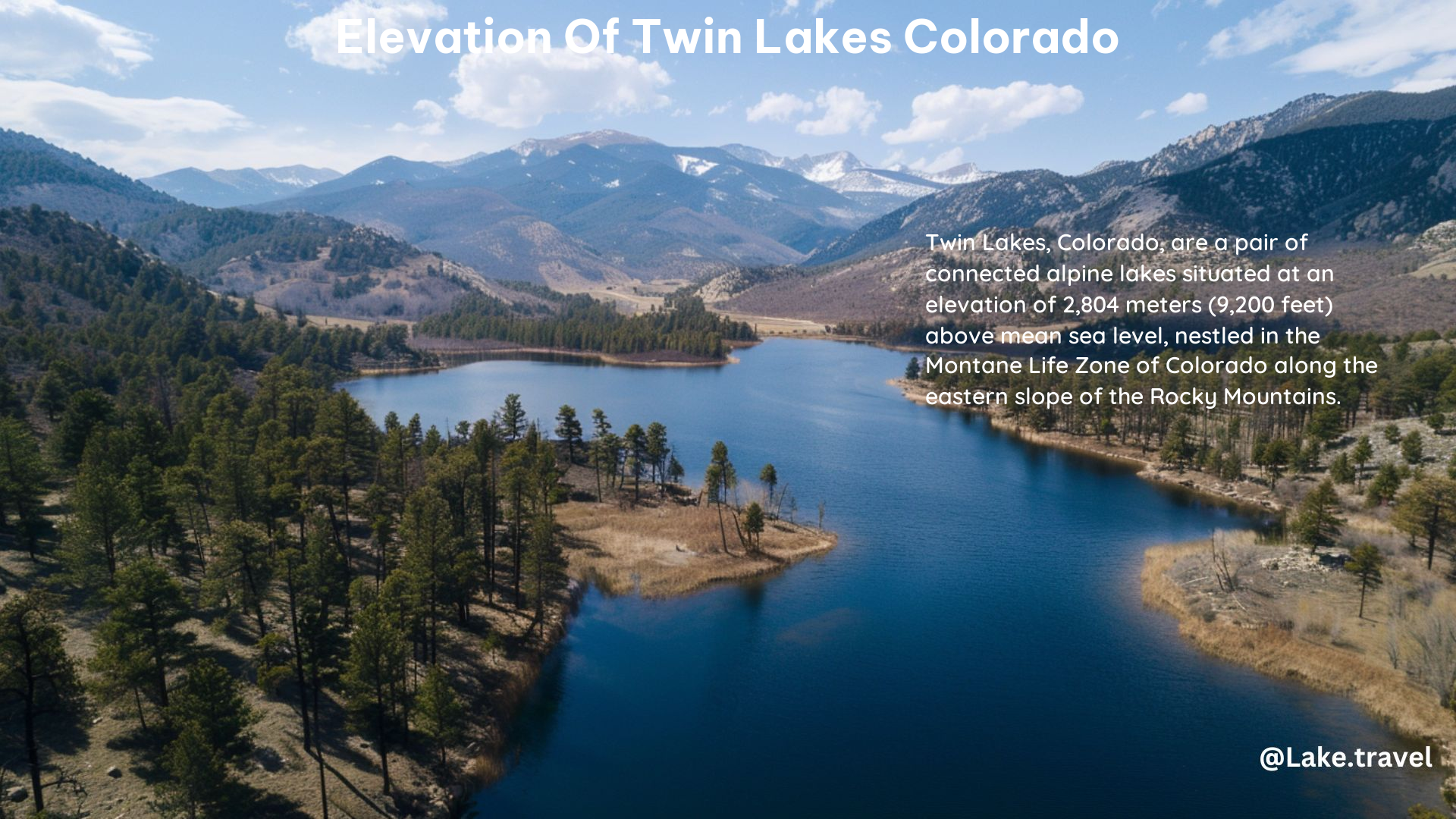The Twin Lakes in Colorado are situated at an impressive elevation of 2,804 meters (9,200 feet) above mean sea level, nestled within the Montane Life Zone of the Rocky Mountains. These two connected lakes, Upper Twin Lakes and Lower Twin Lakes, offer a breathtaking natural landscape for outdoor enthusiasts and nature lovers alike.
The Elevation of Twin Lakes Colorado
The Twin Lakes in Colorado are located at an elevation of 2,804 meters (9,200 feet) above mean sea level. This high-altitude setting places the lakes firmly within the Montane Life Zone, a unique ecological region characterized by its diverse flora and fauna.
Before human intervention in the late 1800s, the natural fluctuation of surface elevation in each lake did not exceed 0.6 meters annually, with the Upper Twin Lakes being nearly 2 meters higher than the Lower Twin Lakes.
The Montane Life Zone: A Diverse Ecosystem

The Montane Life Zone, where the Twin Lakes are situated, is a transitional zone between the lower-elevation Foothills and the higher-elevation Subalpine Zone. This region is characterized by a mix of coniferous and deciduous forests, with species such as ponderosa pine, Douglas fir, and aspen trees thriving in the cool, moist climate.
The Montane Life Zone is also home to a variety of wildlife, including elk, mule deer, black bears, and a wide range of bird species. The lakes themselves provide habitat for a variety of aquatic life, including trout and other fish species.
The Impact of Human Intervention
In the late 1800s, the ecology of the Twin Lakes began to change due to the introduction of exotic species and modifications to the hydraulic regime. These changes were driven by the desire to convert the lakes into water-supply reservoirs for irrigation and mining purposes.
The introduction of these human-induced changes resulted in increased erosion, the deposition of woody debris in the bottom of Upper Twin Lakes, and extreme hypolimnetic anoxia (lack of oxygen in the lower layers of the lake) during severe winters. This, in turn, led to the release of toxic metals from the sediments, further impacting the delicate ecosystem.
Recreational Activities at the Twin Lakes
Today, the Twin Lakes area is managed by the U.S. Forest Service for a variety of outdoor recreational activities. Visitors can enjoy camping, picnicking, hiking, and other outdoor pursuits in the stunning natural setting.
The Colorado Division of Wildlife also manages the lakes for sport fishing, primarily stocking them with rainbow trout and maintaining a self-sustaining population of lake trout.
Exploring the Twin Lakes
Visitors to the Twin Lakes can enjoy a range of activities, from hiking and camping to fishing and water sports. The area offers several hiking trails, including the popular Twin Lakes Trail, which provides stunning views of the lakes and the surrounding mountains.
For those interested in fishing, the lakes are stocked with rainbow trout and are home to a self-sustaining population of lake trout. Anglers can enjoy the challenge of catching these prized fish in the clear, high-altitude waters.
Camping is another popular activity at the Twin Lakes, with several campgrounds located in the area. Visitors can pitch their tents and enjoy the peaceful solitude of the Montane Life Zone, surrounded by the majestic peaks of the Rocky Mountains.
Conclusion
The Twin Lakes in Colorado, situated at an elevation of 2,804 meters (9,200 feet), offer a unique and breathtaking natural experience for outdoor enthusiasts and nature lovers. From the diverse Montane Life Zone ecosystem to the range of recreational activities available, the Twin Lakes are a true gem of the Rocky Mountains.
Whether you’re drawn to the serene beauty of the lakes, the challenge of fishing, or the thrill of hiking in the high-altitude terrain, the Twin Lakes are a must-visit destination for anyone exploring the wonders of Colorado’s natural landscapes.
